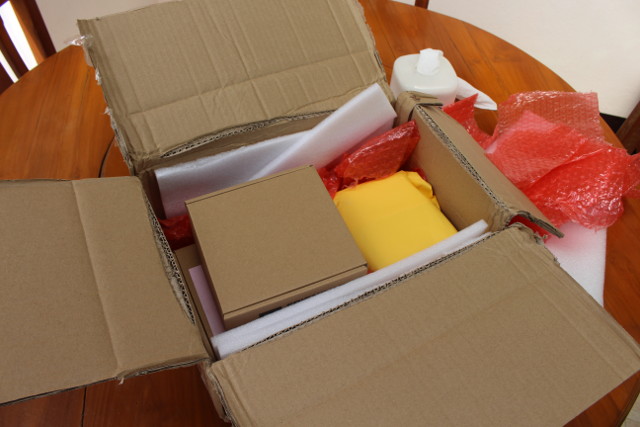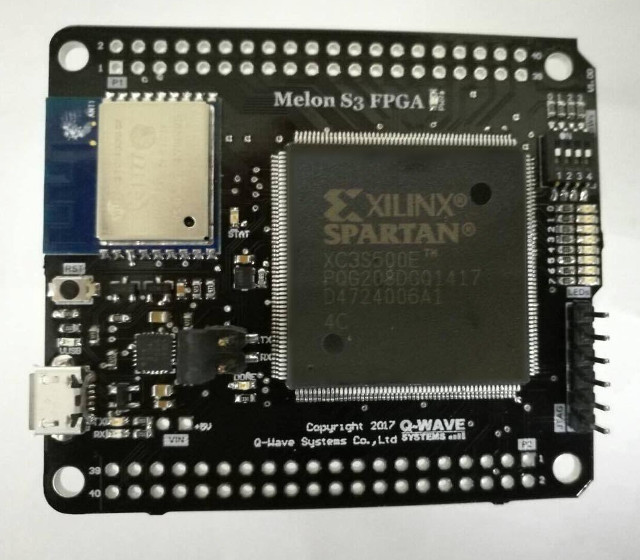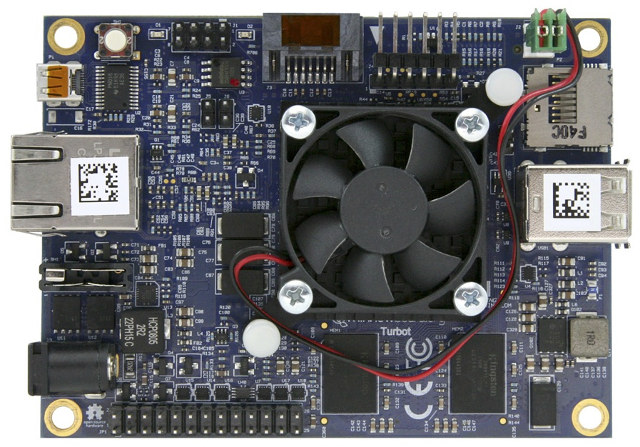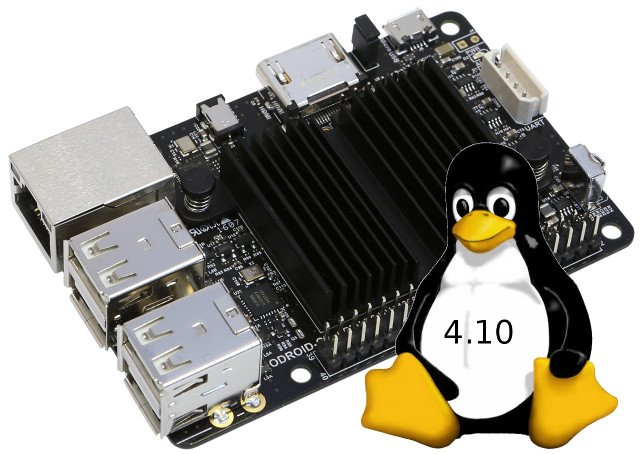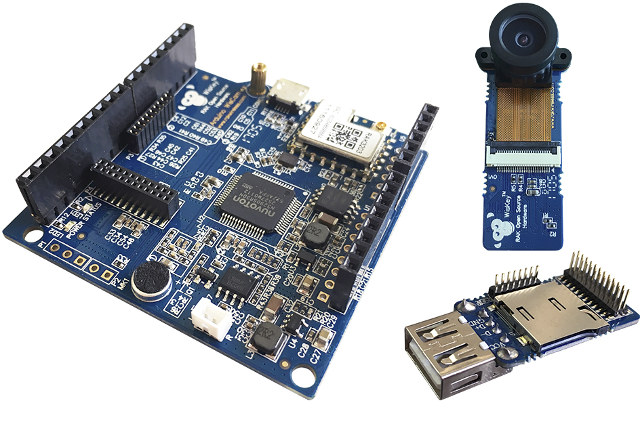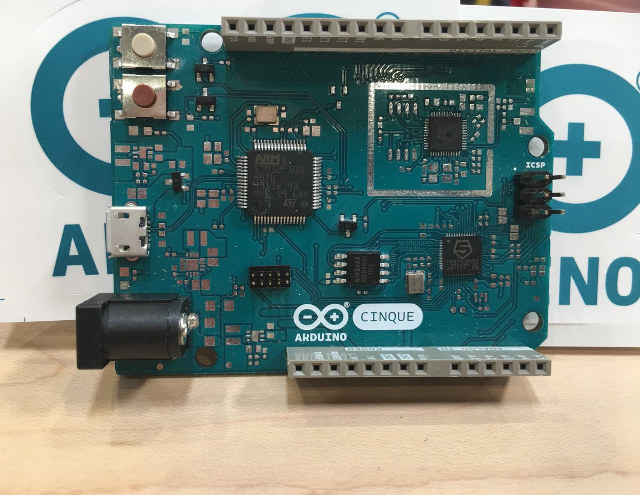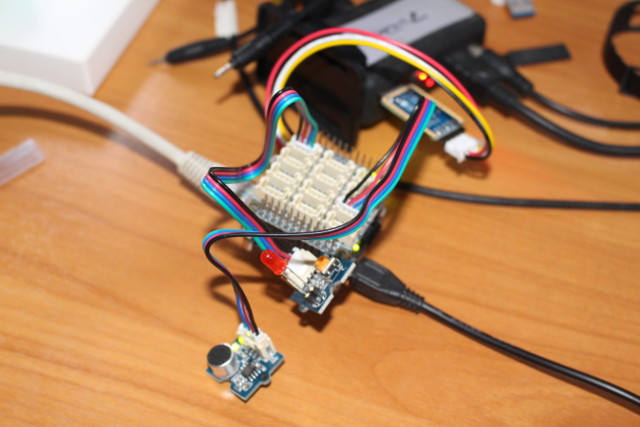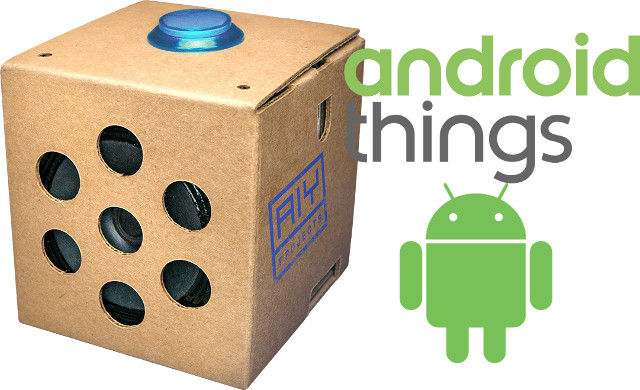FriendlyELEC will send me some review samples from time to time, and normally I just ask for one item, but they aways send a bunch of their products instead. This time I asked for a NanoPi NEO NAS Kit v1.2 to play with, but I got clearly more than what I asked for… Let’s start with the box at the top. It contains “NanoPi NEO complete starter kit” selling for $29.99for $29.00 with the following items: NanoPi NEO board NanoHat OLED Heatsink and thermal pad kit Akuminum housing a Mico USB cable A micro SD card pre-loaded with NEO OLED Ubuntu firmware. Three buttons, and screws It’s actually not fully complete, as you’d need to provide and solder your own male headers to NanoPi NEO board. I did not have time for soldering that day, but the final results should be really neat based on pictures from their website. If […]
Melon S3 FPGA Arduino & Raspberry Pi Compatible Board is Programmable over WiFi using ESP8266 WiSoC
Q-Wave Systems, an embedded systems company based in Thailand, has designed Melon S3 FPGA board powered by a Xilinx Spartan 3E FPGA with WiFi connectivity added through a ESP8266 module programmable with the Arduino IDE , and featuring two Raspberry Pi compatible headers. The FPGA bitstream can be updated over WiFi, and does not require a JTAG debugger. Melon S3 FPGA specifications: FPGA – Xilinx Spartan XC3S500E FPGA with 500K gates, 73Kb Distributed RAM, 4 Digital Clock Manager (DCM), 20 Multipliers (18×18), 360 Kb Block RAM WiFi module – WROOM-2 with Espressif ESP8266 32-bit MCU @ 80 MHz supporting 802.11 b/g/n WiFi. Storage – 4MB SPI flash in total with 1MB for ESP8266, 3 MB for FPGA Expansion – 2x 40-pin Raspberry Pi compatible headers; 3.3V tolerant Debugging – Onboard USB-UART Silicon Labs CP2104 for configuration, debugging and power; 6-pin JTAG port for debugging/programming Misc – 8x Users LEDs, 4x […]
MinnowBoard Turbot Quad Core Open Source Hardware Board is now Shipping for $190
MinnowBoard Turbot Quad Core board was announced last autumn, with shipping expected in December 2016, but there may have been delays as the MinnowBoard foundation has just announced that the Intel open source hardware board is now shipping. MinnowBoard Turbot Quad “MBT-4220” board specifications: SoC – Intel Atom E3845 quad core Bay Trail-I processor @ up to 1.92 GHz with Intel HD graphics @ 542 / 792 MHz (10W TDP) System Memory – 2GB DDR3L 1067 MT/s (Soldered) Storage – 1x SATA2 3Gbps, 1x micro SD card slot, 8 MB SPI Flash for firmware (Tianocore UEFI, Coreboot, SeaBIOS) Video & Audio Output – 1x micro HDMI connector Connectivity – 10/100/1000M Ethernet RJ-45 connector (with Intel i211 instead of Realtek NIC on dual core MinnowBoard) USB – 1x USB 3.0 host, 1x USB 2.0 host Debugging – Serial debug header Expansion headers Low-speed expansion (LSE) port – 2×13 (26-pin) male 0.1″ […]
ODROID-C2 Board Gets Experimental Ubuntu 16.04 Armbian Images with Linux 4.10
Hardkernel is doing a good job at providing working images with GPU / VPU support, and documentation for their ODROID boards. But while Exynos based ODROID-XU4(Q) boards already get firmware images with a recent Linux 4.9 kernel, Amlogic S905 based ODROID-C2 board’s Ubuntu 16.04 images still rely on the Linux 3.14 kernel released by Amlogic, plus various patchsets. But we’ve seen BayLibre is working on a Linux mainline port for Amlogic processors, and Armbian community appears to have leveraged that work, and added Ubuntu 16.04 Server and Desktop images with Linux 4.10 to their build system. Those are experimental nightly builds so they may not have been tested, and it’s likely not working as well as the Ubuntu 16.04 “legacy” images released by Hardkernel. They are also not shown in Armbian ODROID-C2 page at the time of writing, but it’s a step in the right direction. Jean-Luc Aufranc (CNXSoft)Jean-Luc started […]
RAK WisCam is a $20 Arduino Compatible WiFi Camera Linux Board Powered by Nuvoton N32905 ARM9 Processor
A couple of weeks ago I wrote about Rakwireless’ RAK CREATOR Pro development board based on Realtek Ameba RTL8711AM Wireless MCU, and part of their Wiskey family of development boards. Sub-family include WisNode for IoT boards, WisAP for OpenWrt boards, WisPLC for PLC hardware, and WisCam for WiFi video camera boards. The company has recently introduced Wiscam RAK5281 Arduino compatible Linux board powered by a Nuvoton ARM9 MCU, and supporting a camera module or an SD card + USB module. RAK WisCam specifications: SoC – Nuvoton N32905R3DN ARM926EJ processor @ 200 MHz with 8KB internal SRAM, 16KB IBR internal booting ROM, 16Mbit x16 DDR2 memory Storage – 128 MBit SPI flash, included sub-module adds micro SD card Connectivity – 802.11 b/g/n WiFi via Realtek RTL8189FTV module Camera via sub-module 648×488 pixel VGA CMOS Image Sensor (GC0308); 102° FOV Video – QVGA (320×240) 30FPS, VGA(640×480) 30FPS, MJPEG encoding Photo – JPEG, […]
Arduino Cinque Combines SiFive RISC-V Freedom E310 MCU with ESP32 WiFi & Bluetooth SoC
SiFive introduced the first Arduino compatible board based on RISC-V processor late last year with HiFive1 development board powered by Freedom E310 MCU, but the company has been working with Arduino directly on Arduino Cinque board equipped with SiFive Freedom E310 processor, ESP32 for WiFi and Bluetooth, and an STM32 ARM MCU to handle programming. Few other technical details have been provided for the new board, but since it looks so similar to HiFive1, I’ve come with up with preliminary/tentative Arduino Cinque specifications: MCU – SiFive Freedom E310 (FE310) 32-bit RV32IMAC processor @ up to 320+ MHz (1.61 DMIPS/MHz) WiSoC – Espressif ESP32 for WiFi and Bluetooth 4.2 LE Storage – 32-Mbit SPI flash I/Os 19x Digital I/O Pins 19x external interrupt pins 1x external wakeup pin 9x PWM pins 1/3 SPI Controllers/HW CS Pins I/O Voltages – 3.3V or 5V supported USB – 1x micro USB port for power, […]
Using GPIOs on NanoPi NEO 2 Board with BakeBit Starter Kit
NanoPi NEO 2 is a tiny 64-bit ARM development board powered by Allwinner H5 processor. FriendlyELEC sent me a couple of NEO 2 samples together with their BakeBit Start Kit with a NanoHat and various modules via GPIOs, analog input or I2C. I’ve already tested both Armbian with Linux 4.11 and Ubuntu Core Qt with Linux 3.10, and ran a few benchmarks on NanoPi NEO 2. You would normally prefer to use the Armbian image with Linux mainline since it provided better performance, but at the time I was told GPIO support was not there. Configuring NanoPi NEO 2 board with BakeBit library So this week-end, when I decided to test GPIO support and BakeBit Starter Kit, I decided to follow this advice, especially nanopi-neo2-ubuntu-core-qte-sd4g-20170329.img.zip image is still the recommended one in the Wiki. So I went with that image. I’ll use Python examples from Bakebit library, but if you […]
Android Things Developer Preview 4 Released with Google Assistant SDK Support
Earlier this month, Google released a preview of the Google Assistant SDK that works on boards running Debian like the Raspberry Pi 3, and even launched AIY Project Voice Kit for the later. You can now play with Google Assistant on Android Things as the company has just released Android Things Developer Preview 4 with support for Google Assistant SDK. The operating systems works on any Android Things certified devices, but the example instructions for Google Assistant API on Android Things also include steps to use Raspberry Pi 3 board together with AIY Projects Voice kit. The developer preview 4 also adds I2S to the peripheral I/O API and is demonstrated in the aforementioned example, and new hardware support with NXP i.MX7D based Pico Board equipped WiFi & Bluetooth, Ethernet, USB ports, an audio jack, and an I/O expansion port. Android Things DP4 also brings the ability for developers to […]


